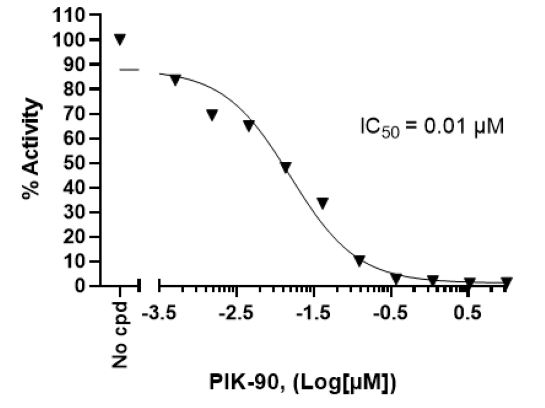Chemi-Verse™ PI3 Kinase (p120γ) Kinase Assay Kit
The Chemi-Verse™ PI3 Kinase (p120γ) Kinase Assay Kit is designed to measure PI3 (phosphoinositide 3) kinase (p120γ) kinase activity for screening and profiling applications using ADP-Glo™ as a detection reagent. The assay kit comes in a convenient 96-well format, with enough purified recombinant PI3 kinase (p120γ), kinase substrate, ATP, and kinase assay buffer for 100 enzyme reactions.
- ADP-Glo™ Kinase Assay (Promega #V6930)
- DTT (Dithiothreitol), 1M, optional
- Microplate reader capable of reading luminescence
- Adjustable micropipettor and sterile tips
- 30°C incubator
| Catalog # | Name | Amount | Storage |
| 40625 | PI3 kinase (p120γ), His-Tag* | 2.5 µg | -80°C |
| 79334 | 5x Kinase Buffer 1 | 1.5 ml | -20°C |
| 79386 | 500 µM ATP | 50 µl | -20°C |
| 40560 | PI3K Lipid Substrate (Packaged separately, Do Not Freeze!) | 500 µl | 4°C |
| 79696 | White 96-well plate | 1 | Room Temp |
*The concentration of the protein is lot-specific and will be indicated on the tube.
PI3 (phosphoinositide 3) kinase, or phosphatidylinositol 3 kinases, are a family of proteins that can be subdivided into four classes: I, II, III and IV. Class I are involved in converting PI (4, 5) P2 (phosphatidylinositol (4, 5)-biphosphate) into PI (3, 4, 5) P3 (phosphatidylinositol (3, 4, 5)-triphosphate) when activated by tyrosine kinase receptors and G-protein coupled receptors. p120γ is also known as PIK3CG (phosphatidylinositol-4,5-biphosphate 3-kinase catalytic subunit), PI3Kγ or p110γ and belongs to class IB. p120γ plays a role in chemotaxis, cytokine release and ROS (reactive oxygen species) generation and is thus an important player in the innate and adaptive immune systems. It has been linked to inflammatory diseases, such as RA (rheumatoid arthritis), atherosclerosis and other cardiovascular pathologies, lupus and cancer. The use of p120γ inhibitors combined with immune checkpoints inhibitors has potential in cancer therapy. Further studies into the modes of action and structure of p120γ will allow the development of more selective inhibitors and advance the treatment of inflammatory diseases and cancer linked to this protein.
Rathinaswamy M., et al., 2021, Sci Adv 7 (35): eabj4282.


